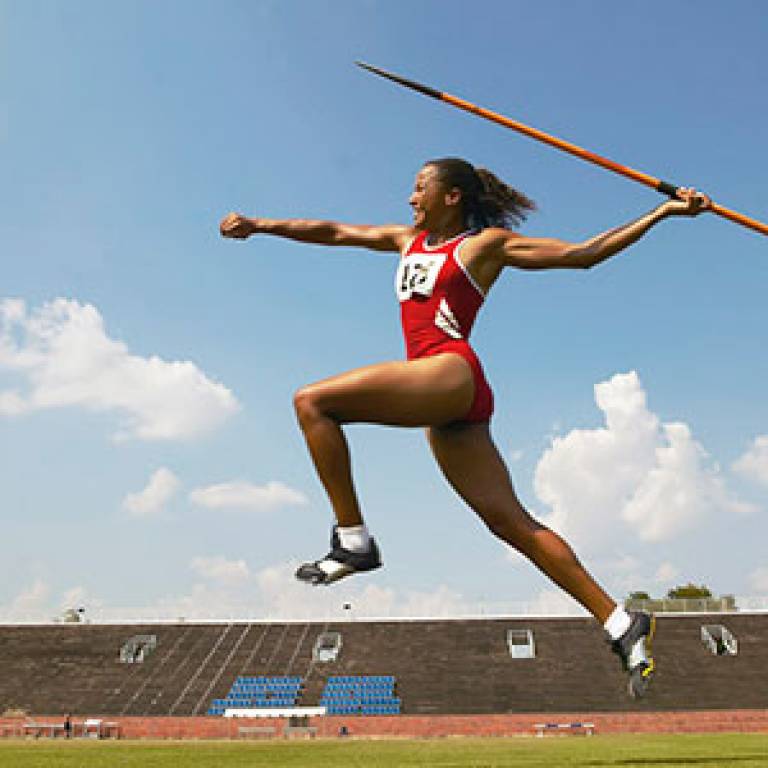Oral health problems in elite athletes 'must be addressed'
14 October 2014
Poor oral health affecting athletes' general health and performance shows 'no signs of improvement' and must be remedied, say a group of UCL-led health experts and sporting bodies.

In a consensus statement published in the British Journal of Sports Medicine, the authors call for action to tackle poor oral health among athletes. They say that simple measures such as encouraging better brushing and flossing could provide the same marginal performance gains as expensive physical therapies.
The statement came out of the April 2014 Oral Health and Performance in Sport collaboration led by Professor Ian Needleman of the UCL Eastman Dental Institute and Professor Fares Haddad of the Institute of Sport Exercise and Health (ISEH). This resulted in a conference held at UCL where experts in oral health and sports medicine met with sporting associations and elite athletes to produce a consensus on how to improve oral health in sport.
A UCL survey at the London 2012 Olympic Games found that 18% of athletes said that their oral health had a negative impact on their performance and 46.5% had not been to the dentist in the past year. The latest consensus statement aims to address such issues by embedding oral health into the wider culture of sports healthcare and health promotion.
"Oral health could be an easy win for athletes, as the oral conditions that can affect performance are all easily preventable," says Professor Needleman. "Professional athletes and their teams spend a lot of time and money on ways to marginally improve performance, as this can make all the difference in elite sports. Simple strategies to prevent oral health problems can offer marginal performance gains that require little to no additional time or money. Things like better tooth brushing techniques and higher fluoride toothpastes could prevent the toothache and associated sleeping and training difficulties that can make the crucial difference between gold and silver."
Things like better tooth brushing techniques and higher fluoride toothpastes could prevent the toothache and associated sleeping and training difficulties that can make the crucial difference between gold and silver.
Professor Ian Needleman
The intense dietary and training pressures on athletes could put them at high risk of oral health problems for many reasons. Saliva helps to protect teeth from decay and erosion, so dehydration and drying of the mouth could increase the risk of oral health problems. The amount of energy that athletes need for training often means they have high-carbohydrate diets and regularly use sugary, acidic energy drinks. These may contribute to decay and erosion in athletes' teeth.
"We do not want to demonise energy drinks and are not saying that athletes shouldn't be using them," says Professor Needleman. "However, people should be aware of the risks to oral health and can take simple measures to mitigate these. For example, water or hypotonic drinks are likely to be more suitable for simple hydration, and spit don't rinse after tooth brushing. For sports where athletes need a lot of energy drinks, high fluoride toothpastes and mouthrinses should be seriously considered."
The authors also recommend regular dental appointments to identify and address oral health issues before they can affect performance. Olympic athletes are all supposed to have a dental check-up within 12 months of the competition but, as the previous survey found, almost half of the athletes London 2012 had not. The consensus statement calls for national sport funders and policy organisations to take the lead in ensuring that oral health is regularly assessed, especially pre-season, to allow for personalisation of prevention plans and early treatment of any disease.
Dr Mike Loosemoore, Lead Consultant in Sport and Exercise Medicine at the Institute of Sport, Exercise and Health, says: "I think this is an important consensus statement. My experience of instituting a programme of improving oral health in elite sportsman has had a very positive effect."
Links
- Consensus statement in the British Journal of Sports Medicine [Open Access]
- Professor Ian Needleman's academic profile on Iris
- UCL Eastman Dental Institute
- Institute of Sport Exercise and Health
Image
- Javelin Thrower in Action (Courtesy of tableatny on Flickr)
 Close
Close

